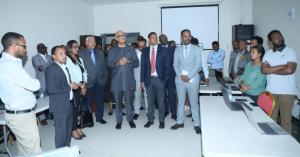WHO Regional Director's visit to Ethiopia enhancing emergency preparedness and response
Emergency preparedness and response are critical for global health security in an era of increasing public health threats. From pandemics to natural disasters, African nations face complex health emergencies requiring swift and coordinated responses. Recognizing the urgency of strengthening health security, Dr. Chikwe Ihekweazu, Acting WHO Regional Director for Africa, and Dr. Abdou Salam, WHO Regional Emergency Director, conducted a high-level mission to Ethiopia from March 13 to 14, 2025. One of the primary objectives of the visit was to enhance collaboration in public health emergency management and to underscore Ethiopia’s pivotal role as a regional hub for health security.
During a meeting with Ethiopia’s Minister of Health, H.E. Dr. Mekdes Daba, discussions focused on the crucial need to strengthen the country’s Public Health Emergency Management system. The Minister emphasized the government’s commitment to improving early warning and rapid response mechanisms through the Ethiopian Public Health Institute (EPHI). She also highlighted plans to establish a permanent Emergency Medical Team (EMT) centre to support national and regional response efforts. Ethiopia’s strategic advantage as the home of a major airline was noted as an opportunity to position the country as a dispatch hub for emergency medical deployments across Africa. Additionally, the Minister underscored the vital need for stronger collaboration between WHO and the African Centres for Disease Control and Prevention (Africa CDC) to ensure joint emergency response and data-sharing. WHO’s Regional Director commended Ethiopia’s leadership in health security and acknowledged the ongoing development of a Memorandum of Understanding (MoU) to formalize collaboration on emergency preparedness, primary healthcare, and workforce capacity-building.
Dr. Ihekweazu and his delegation visited EPHI, Ethiopia’s central institution for emergency surveillance and response. The institute’s leadership outlined its dual priorities—digitization and capacity-building—aimed at transforming EPHI into a Center of Excellence for Public Health Emergency Management in Africa. Discussions focused on WHO’s support in strengthening Ethiopia’s digital emergency surveillance systems, including the District Health Information Software 2 (DHIS2), the electronic Public Health Emergency Management system (ePHEM), and Epidemic Intelligence from Open Sources (EIOS). Ethiopia’s rapid response teams, the Field Epidemiology Training Program (FETP), and the African Volunteer Health Corps (AVHOC) were also highlighted as critical assets for emergency preparedness. Another key area of collaboration was the integration of multiple outbreak responses—including cholera, polio, and measles—under a unified Incident Management System (IMS).
Despite Ethiopia’s progress, several challenges remain. EPHI has requested WHO’s support in mobilizing $70 million to fully establish its Center of Excellence for Public Health Emergency Management. Additionally, urgent requests were made for polio vaccine support and additional resources to combat ongoing outbreaks. Strengthening workforce training and equipping frontline health workers with the necessary tools remain critical priorities. Dr. Ihekweazu reaffirmed WHO’s commitment to supporting Ethiopia’s vision by expanding its emergency response efforts across the six regional hubs in Africa, advancing Ethiopia’s designation as a WHO Collaborating Center, and enhancing coordination with international partners to scale up emergency response financing.
As Africa faces evolving health threats, Ethiopia’s proactive approach to emergency preparedness offers a model for the region. WHO’s engagement in strengthening national health security mechanisms highlights the importance of sustained investment in early detection, rapid response, and resilient health systems. Moving forward, strong partnerships, digital innovation, and workforce training will be essential to safeguarding public health and ensuring Africa’s readiness for future emergencies.
